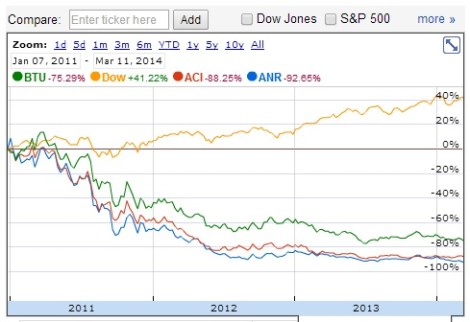Another executive has apparently decided to ditch the shrinking US coal mining industry: Bill Koch, who made billions selling petcoke and coal with his company Oxbow Carbon. Energy and Environment News reports:
“The coal business in the United States has kind of died,” Koch said during a phone interview Friday, “so we’re out of the coal business now.”
Bill Koch is the younger brother of notorious oil billionaires Charles and David Koch, and while he has not played a major role in funding climate denial and right wing extremist groups like his brothers, he has used his wealth in other ways to try and protect his fossil fuel business from competition and health, labor, and environmental safeguards. Bill Koch’s role in funding attacks on the Cape Wind project was detailed in this 2010 report, and more recently he gave millions to super PACs in the 2012 elections to try to defeat President Obama, taking advantage of the controversial Citizens United Supreme Court ruling.
Bill Koch is just the latest executive to leave the coal mining business in recent years. A recent article in SNL, a trade publication which closely tracks the coal industry, detailed the departures from several coal companies:
Top executives at several major coal companies have retired or resigned in recent years amid mounting challenges facing the industry. One executive recruiter suggested to SNL Energy in 2013 that the pressure may be prompting some executives to re-evaluate their futures.
In 2012, Arch Coal Inc.‘s Steven Leer, the company’s CEO since its formation in 1997, announced plans to retire. Leer said Feb. 28 that he was retiring as board chairman following Arch’s annual shareholder meeting in April.
Richard Whiting exited as Patriot Coal Corp.‘s president and CEO just before the company filed for bankruptcy protection in 2012.
In July 2013, metallurgical coal and iron ore producer Cliffs Natural Resources Inc. said President and CEO Joseph Carrabba informed the company’s board of his plans to retire. He had served as president and CEO of the company since September 2006.
In August 2013, coal and gas producer Rhino Resource Partners LP announced that CEO and President David Zatezalo was retiring as CEO.
The flurry of retirements has not been limited to the U.S. BHP Billiton
announced the retirement of CEO Marius Kloppers in February 2013. Tom Albanese stepped down as Rio Tinto‘s CEO in early 2013 following the company’s $14 billion write-down on investments.
That’s why Alpha Natural Resources, the third largest US coal mining company, recently offered its top executives $2 million retention bonuses – even though the company’s stock has lost 92% of its value over the last three years. The values of other publicly traded coal companies have also plummeted – Peabody’s stock has fallen by 75% since early 2011 , while Arch Coal has fallen 88%.
The critical question of course is whether the US coal industry will recover from its current “kind of dead” state, and that will depend in part on the effectiveness of the industry’s two main efforts to keep selling its rocks despite competition from cheaper and cleaner energy and growing concerns about the impacts of burning coal on our air, water, and climate. The first is the effort by the coal industry and its allies to weaken or block Clean Air Act rules that would reduce carbon pollution from power plants. The second is pushing coal export terminals to expand sales to overseas markets. Since coal is Americans’ “least favored” energy source, the industry uses front groups and misleading PR efforts for both efforts – though even the industry itself recognizes that its main messaging strategy “never resonated with much conviction among ordinary Americans. For them, the EPA keeps the air and water clean, their kids safe.”
Clearly some coal executives are beginning to suspect that more of this same “strategy” isn’t likely to rescue the industry.




